With around 10,000 descendants packing the ancestral shrine every Tomb Sweeping Day, the Yeh family’s grand affair made a bid for the Guiness Book of World Records in 2016.
They won’t be coming even close on Saturday. Due to the COVID-19 pandemic, less than 30 people will be attending and conducting the rituals.
“We hope that our ancestors don’t take offense,” branch association head Yeh Lun-tsai (葉倫在) tells the Liberty Times (sister paper of the Taipei Times).
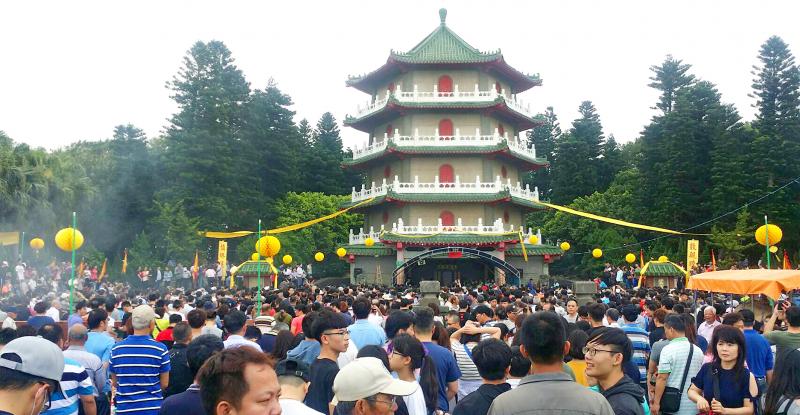
Photo: Chou Min-hung, Taipei TImes
Tomb Sweeping Day activities can potentially aggravate the spread of the virus as large groups congregate in cemeteries and columbariums at the same time. It’s a deeply-rooted tradition that calls for an entire extended family affair, and many believe that it is disrespectful not to attend.
Since early last month, the Centers for Disease Control (CDC) has urged Taiwanese to begin visiting their ancestors’ tombs in advance in small groups, or do their worshipping online through both government and private Web sites as well as live-streamed ceremonies. Minister of Health and Welfare Chen Shih-chung (陳時中) set an example on Tuesday by saying that he had already completed his tomb sweeping rituals.
But as Yeh’s sentiments suggest, a big concern seems to be whether the dead ancestors would actually mind. The Tainan City Government posted on its Facebook page a cartoon with spirits wearing face masks saying, “I hope my descendants don’t come! It’s safer to stay at home!” And CDC deputy chief Chen Tsung-yen (陳宗彥) stressed in Tuesday’s press conference: “I believe that our ancestors all wish that their descendents are safe and healthy.”
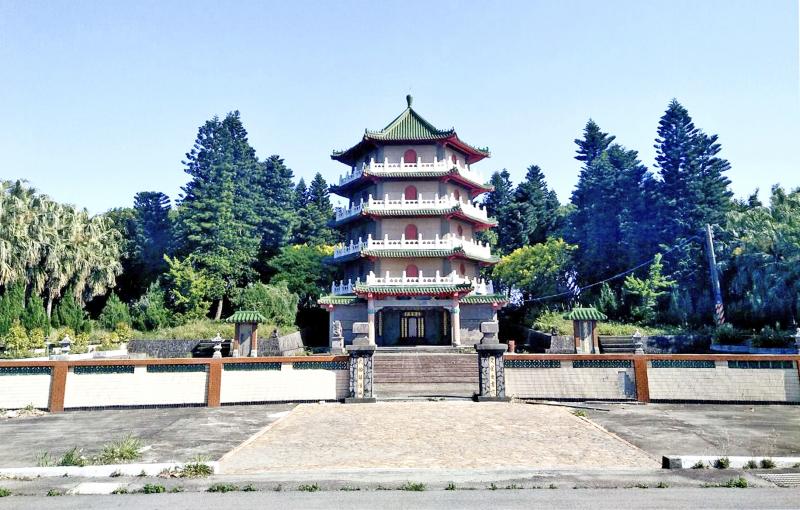
Photo: Lee Jung-ping, Taipei Times
SPEAKING FOR THE DEAD
Several doctors have publicly expressed their concerns over Tomb Sweeping Day and COVID-19, but instead of taking a medical standpoint, they tend to focus on the ancestor’s potential sentiments.
Pediatrician Chen Mu-jung (陳木榮) writes on his Facebook page that he’s heard many stories from his patients about elders pressuring the entire family to attend the tomb-sweeping affairs by accusing them of lacking filial piety.
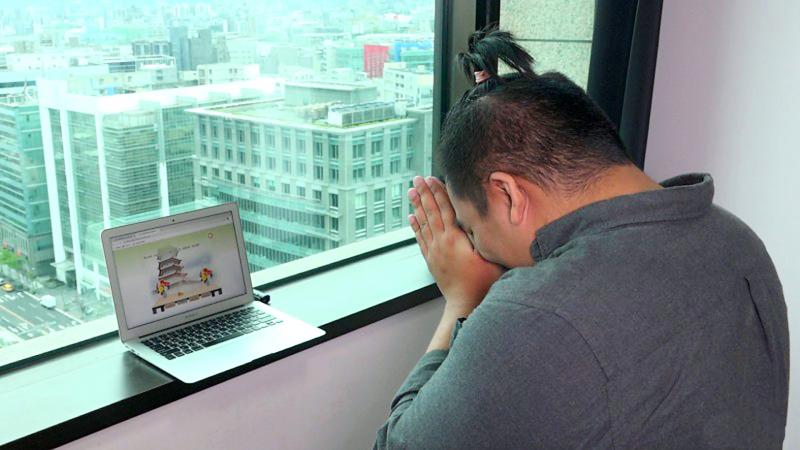
Photo: Yu Chia-wei, Taipei Times
Chen points out that the worst case scenario would result in family members dying from the virus.
“Going straight to the underworld to accompany your ancestors — now that’s real filial piety,” he writes. “If I died and saw that my descendants were in danger, I would be frantically waving my arms on the other side urging them not to come this way.”
He adds that if the elders insist, one can invoke an ancient saying by Chinese philosopher Mencius (孟子): “There are three ways to be unfilial, the biggest one is to have no offspring.” He doesn’t personally agree with the saying, but by this logic, risking one’s life to sweep the graves would be the most unfilial thing to do.
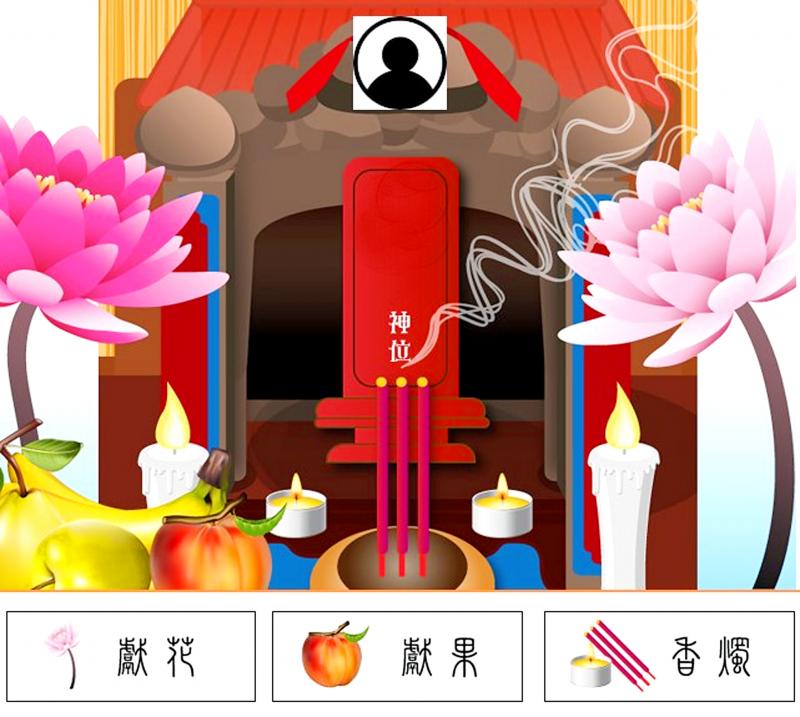
Screenshot
Shih Chin-chung (施景中), an ob-gyn at National Taiwan University Hospital, posted on Facebook that this year, only his eldest male cousin will be heading to the graves. The cousin will live stream the whole process for the other family members to see.
“I believe that my ancestors would understand,” he writes. “Even the Matsu pilgrimages [that attract tens of thousands of people] have been canceled, so why would the ancestors mind? If the pandemic spreads and we end up meeting our ancestors again prematurely — they would never want to see that. To my grandparents and great-grandparents and uncles and aunts in heaven, I’ll see you online this year.”
ADHERING TO TRADITION?
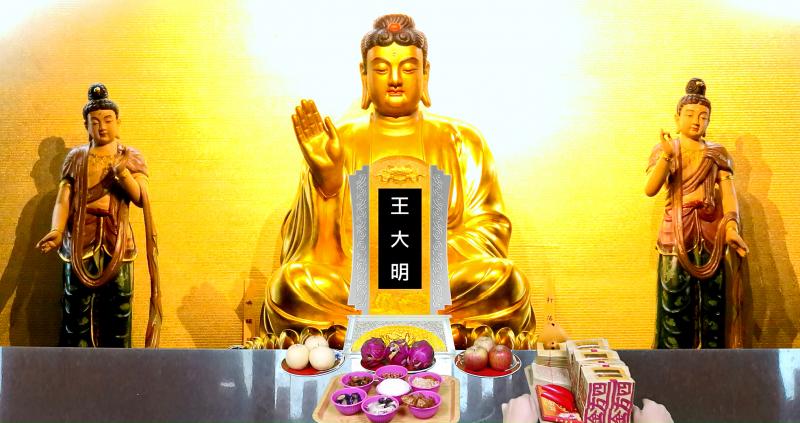
Screenshot
While many columbariums and cemeteries have postponed their mass rituals until later this year, others such as Lung Yen Life Service Corp (龍巖集團), which operates seven columbariums and cemeteries across Taiwan, has been streaming theirs online since March 21 and will continue until later this month. Members are not allowed to attend, but they can order offerings through phone or the Internet. Lung Yen will donate the offerings to charity after the ritual unless specified.
As of yesterday, 11 counties and cities as well as the Ministry of Interior had set up Web sites for people to conduct tomb-sweeping rituals online. Some are quite elaborate — the New Taipei City one has options for those interred in columbariums, military shrines, through ocean burials as well as tree burials. The user can then send a message to the deceased (with a motion graphic of the message rising to the sky) and share photos and videos with other relatives.
There are both Eastern and Western worshipping options — the Eastern one entails praying to a number of Buddhist and Taoist gods and giving virtual offerings to the deceased. The Western one is a simple Christian church where prayers are recited.
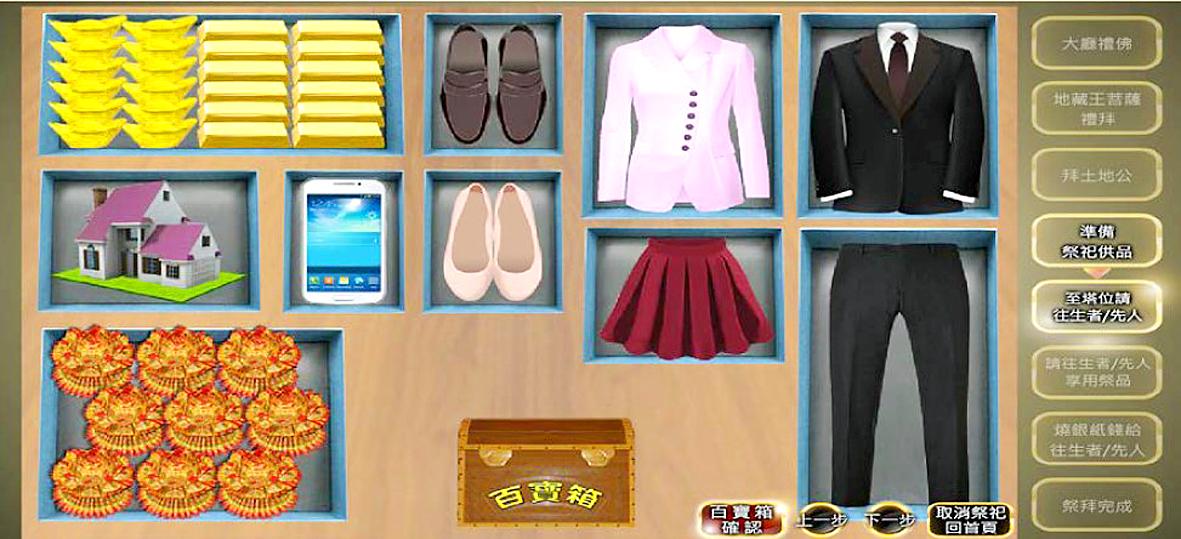
Screenshot
People are obviously using them. Now in its sixth year, New Taipei City’s online service averages 2,000 worshippers per year — but based on the numbers as of this past weekend, it estimates this year’s number to exceed 10,000. After it was launched in January last year, Taichung City’s tomb sweeping Web site only saw 117 worships over the entire year. This year, the number has reached 1,725 as of Tuesday, and is expected to surge even higher this weekend.
However, does it work? On Wednesday last week, Apple Daily asked two fortune tellers to weigh in on the issue in their “Video Talk” segment. Meng Chuan (孟娟) says that worshipping online is just like worshipping a spirit tablet at home, and as long as one’s intentions are sincere, the ancestors will feel them.
Kao Yu-lin (高煜霖) adds that even in the ancient days people performed special “distance worshipping” rituals in times when they could not visit the graves, demonstrating how to do it for those who don’t feel comfortable with online worship.
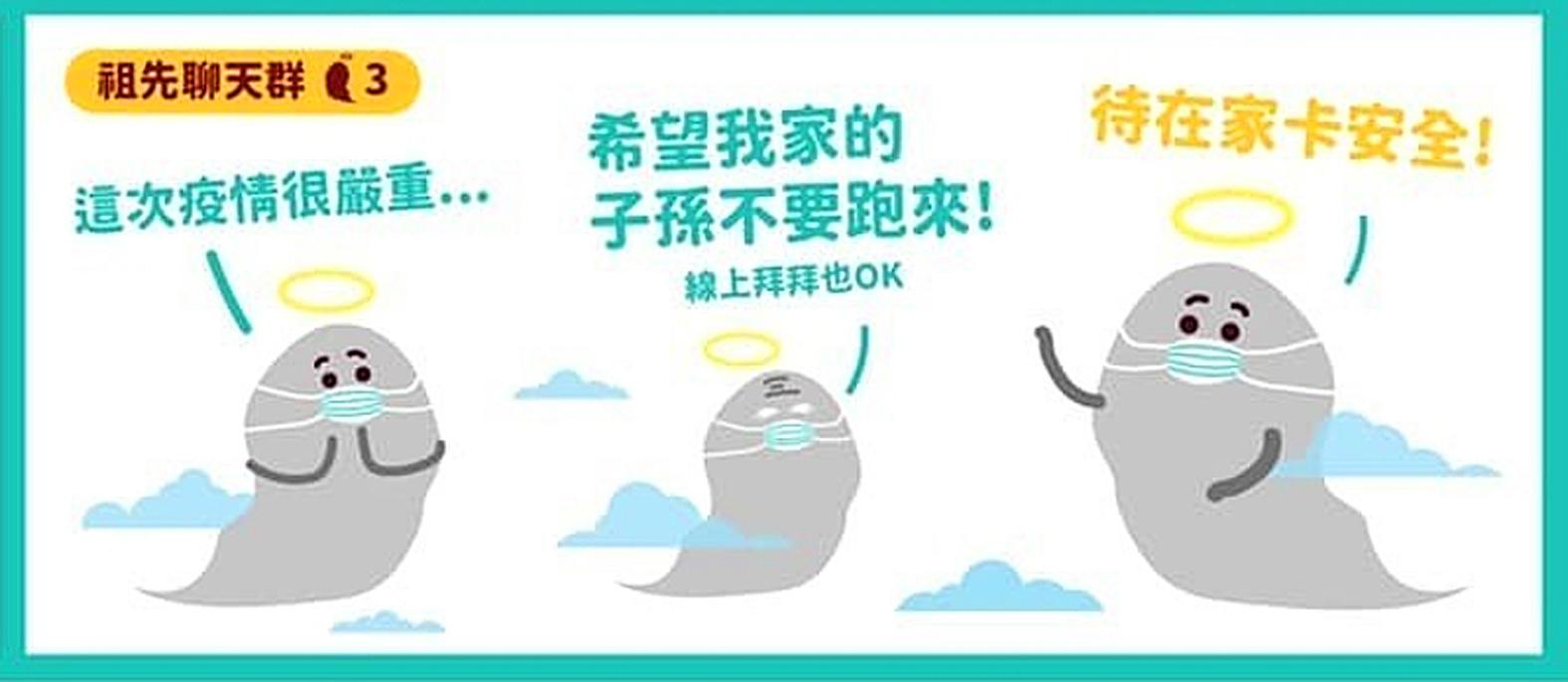
Graphic courtesy of Tainan City Government
Fortune teller Yang Teng-ke (楊登嵙), however, is concerned that the ancestors do not know how to connect to the Internet and might not hear the thoughts and prayers offered online. He believes that it’s more effective to worship the spirit tablet at home or in the family shrine, but agrees that there’s no need to travel to the cemetery in these dire times.
Lin Mao-hsien (林茂賢), an ethnographer of Taiwan’s folk religion and an associate professor at National Taichung University of Education, also says that online worshipping won’t work. In addition to Yang’s concerns about the ancestors’ technological capabilities, Lin points out on his Facebook page that there are two important steps of the ritual that cannot be carried out online: cleaning the graves, and pressing “grave paper” onto the tombs with stones.
“Without these two rituals, it doesn’t count as tomb sweeping,” Lin writes. “Online tomb-sweeping is well-intentioned and does prevent the pandemic from spreading, but it doesn’t meet traditional customs. It’s more practical for the government to emphasize visiting on different days in smaller groups.”

Google unveiled an artificial intelligence tool Wednesday that its scientists said would help unravel the mysteries of the human genome — and could one day lead to new treatments for diseases. The deep learning model AlphaGenome was hailed by outside researchers as a “breakthrough” that would let scientists study and even simulate the roots of difficult-to-treat genetic diseases. While the first complete map of the human genome in 2003 “gave us the book of life, reading it remained a challenge,” Pushmeet Kohli, vice president of research at Google DeepMind, told journalists. “We have the text,” he said, which is a sequence of

On a harsh winter afternoon last month, 2,000 protesters marched and chanted slogans such as “CCP out” and “Korea for Koreans” in Seoul’s popular Gangnam District. Participants — mostly students — wore caps printed with the Chinese characters for “exterminate communism” (滅共) and held banners reading “Heaven will destroy the Chinese Communist Party” (天滅中共). During the march, Park Jun-young, the leader of the protest organizer “Free University,” a conservative youth movement, who was on a hunger strike, collapsed after delivering a speech in sub-zero temperatures and was later hospitalized. Several protesters shaved their heads at the end of the demonstration. A

Every now and then, even hardcore hikers like to sleep in, leave the heavy gear at home and just enjoy a relaxed half-day stroll in the mountains: no cold, no steep uphills, no pressure to walk a certain distance in a day. In the winter, the mild climate and lower elevations of the forests in Taiwan’s far south offer a number of easy escapes like this. A prime example is the river above Mudan Reservoir (牡丹水庫): with shallow water, gentle current, abundant wildlife and a complete lack of tourists, this walk is accessible to nearly everyone but still feels quite remote.

In August of 1949 American journalist Darrell Berrigan toured occupied Formosa and on Aug. 13 published “Should We Grab Formosa?” in the Saturday Evening Post. Berrigan, cataloguing the numerous horrors of corruption and looting the occupying Republic of China (ROC) was inflicting on the locals, advocated outright annexation of Taiwan by the US. He contended the islanders would welcome that. Berrigan also observed that the islanders were planning another revolt, and wrote of their “island nationalism.” The US position on Taiwan was well known there, and islanders, he said, had told him of US official statements that Taiwan had not